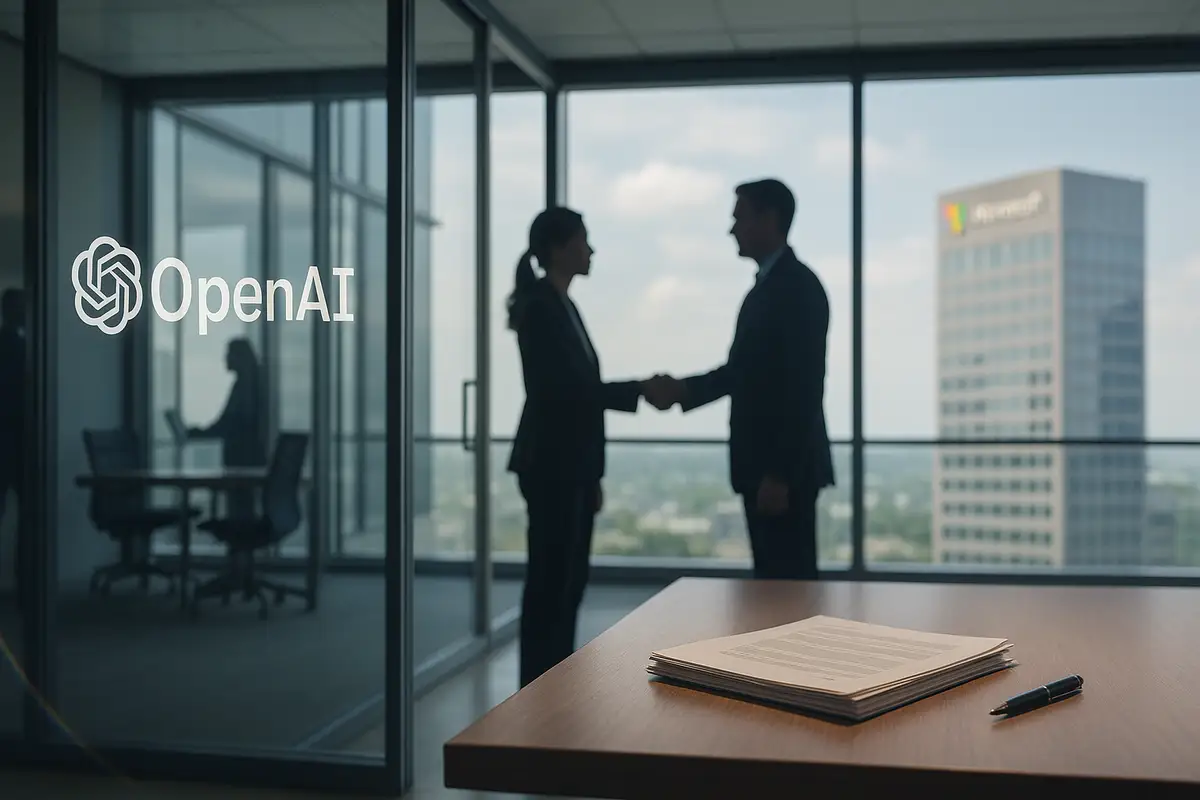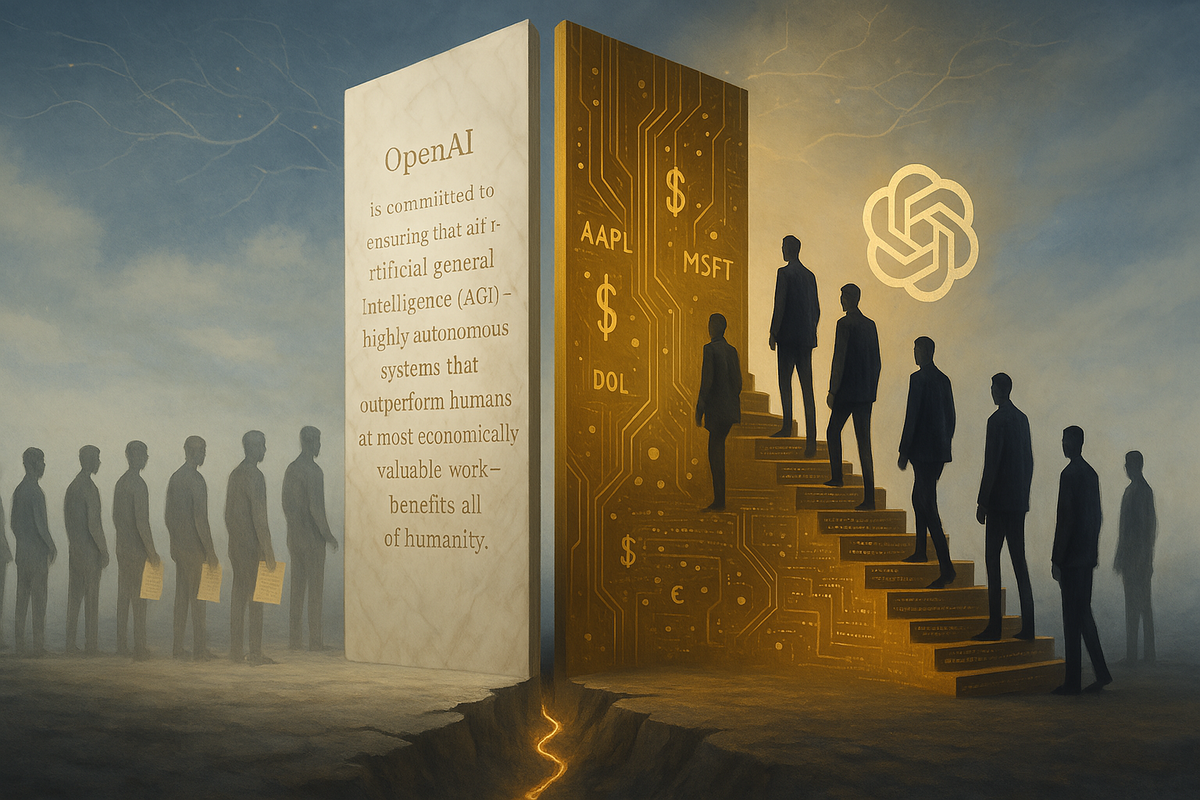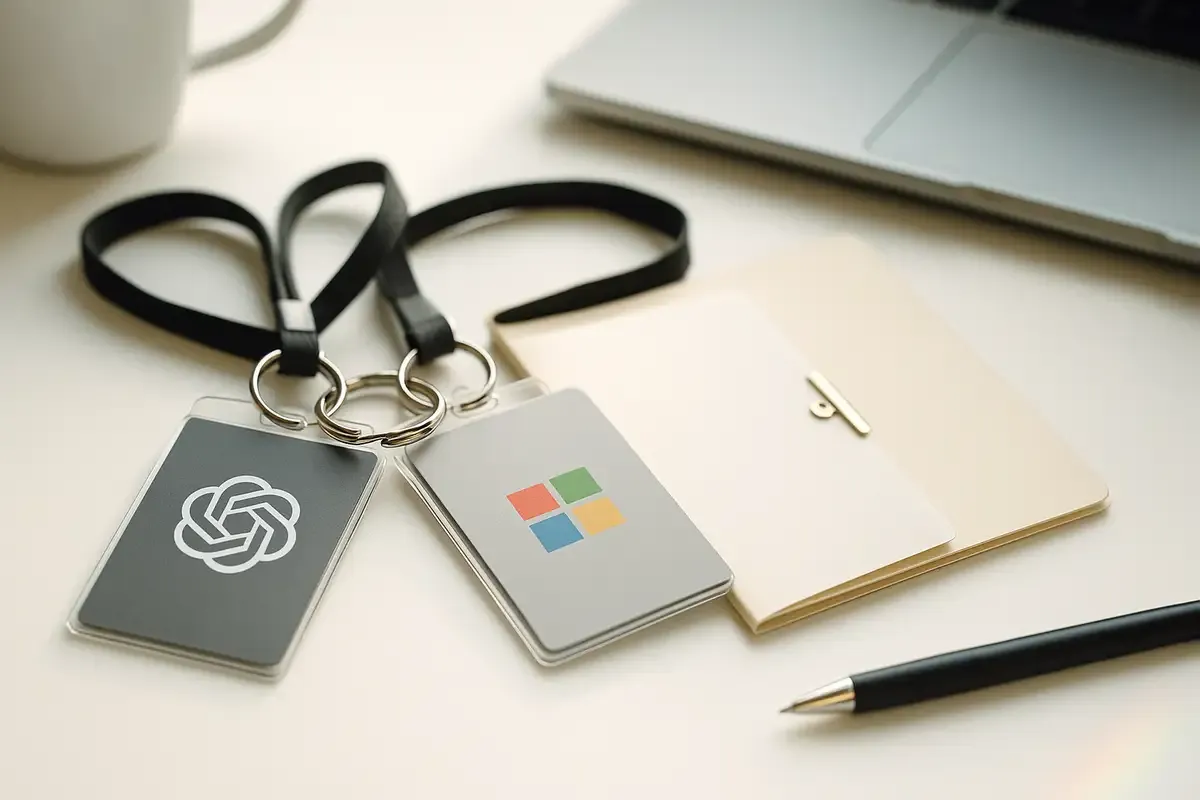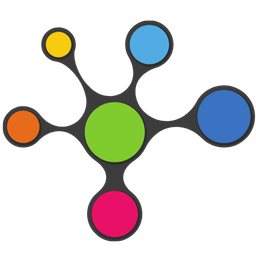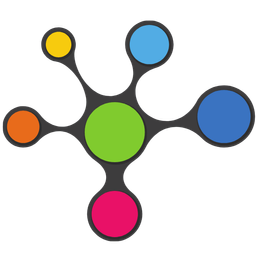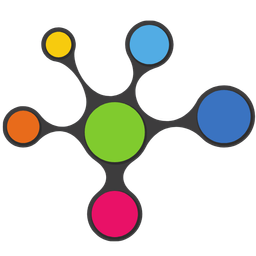💡 TL;DR - The 30 Seconds Version
👉 Microsoft and OpenAI signed a preliminary deal Thursday ending months of toxic negotiations that nearly led to antitrust complaints.
💰 OpenAI's nonprofit parent will receive over $100 billion in equity (roughly 20%) while maintaining control over the new for-profit company.
⏰ The deal removes a key roadblock to OpenAI's restructuring deadline of December 31st, with $19 billion in funding at stake.
📈 Microsoft shares rose 2.4% in after-hours trading, showing investor relief over partnership stability despite diversification efforts.
🔄 The agreement reflects broader industry shift away from exclusive AI partnerships toward hybrid competitive-cooperative relationships.
🏛️ California and Delaware attorneys general must still approve the conversion, while Elon Musk continues legal challenges to block restructuring.
Nonprofit retains control with $100 billion stake. Deal clears path for eventual public offering
Microsoft and OpenAI finally hammered out a preliminary deal Thursday that should end months of ugly behind-the-scenes fighting. The ChatGPT maker gets to restructure into a proper for-profit company, while its nonprofit parent keeps control and walks away with equity worth more than $100 billion.
The non-binding agreement caps what sources described as increasingly toxic negotiations. Things got so bad that OpenAI's executives seriously discussed filing antitrust complaints against Microsoft. Now both sides seem to have gotten enough of what they wanted—Microsoft keeps access to OpenAI's technology, OpenAI gets breathing room to restructure and work with other cloud providers.
This matters because OpenAI's been stuck in corporate limbo. Its weird nonprofit-subsidiary setup made raising serious money nearly impossible, and going public was out of the question. The company told investors it had to fix this by December 31st or watch $19 billion in committed funding disappear.
The stakeholder calculation
Microsoft's main concern was simple: keep the AI technology flowing even after OpenAI achieves artificial general intelligence. Under the old deal, hitting that milestone would've ended their partnership entirely. Microsoft apparently pushed to replace the AGI threshold with something even higher—"artificial superintelligence"—though neither side confirmed that detail.
OpenAI wanted out from under Microsoft's thumb. The software giant had exclusive rights as cloud provider, which meant OpenAI couldn't shop around for better computing deals. That changed earlier this year when OpenAI secured permission to work with Oracle, Google, and others, but the broader partnership restrictions remained.
The nonprofit's piece of this looks impressive on paper. Chairman Bret Taylor says the $100 billion-plus stake would make it "one of the most well-resourced philanthropic organizations in the world." That's roughly 20% if OpenAI hits its target $500 billion valuation—and the stake grows if the company's value keeps climbing.
The regulatory gauntlet
California and Delaware attorneys general still need to sign off on OpenAI's conversion, and both offices are actively poking around. They've raised concerns about everything from child safety to whether this violates charitable law. The AGs wrote recently that "OpenAI and the industry at large are not where they need to be" on safety.
Then there's Elon Musk, who's been suing to block the whole thing. His argument: OpenAI tricked early supporters about staying true to its charitable mission. Various nonprofit advocacy groups have piled on too, worried about the precedent of charitable assets flowing to private investors.
The partner-competitor dynamic has caught attention from antitrust officials in multiple countries. Nobody's figured out how to police relationships where companies share technology in some areas while battling head-to-head in others. The rulebook for these hybrid arrangements basically doesn't exist.
The partnership's strained evolution
Microsoft poured $13 billion into OpenAI starting in 2019, back when the startup was an interesting research project. The investment made Microsoft OpenAI's exclusive cloud provider and gave it first access to whatever technology emerged.
But ChatGPT's runaway success caught Microsoft flat-footed. Suddenly OpenAI wasn't just a research partner—it was a potential threat. Microsoft scrambled to build competing AI capabilities while getting nervous about depending too heavily on a company whose CEO had just been fired and rehired in the span of a few days.
The relationship soured as both companies stepped on each other's turf. Microsoft started working with OpenAI rival Anthropic for Office 365 features and began testing its own AI models for Copilot. Meanwhile, OpenAI signed those massive $300 billion contracts with Oracle and started exploring partnerships with Google Cloud.
Both strategies reflect the same reality: no single partnership can handle the computing and capital demands of frontier AI development. Satya Nadella acknowledged this in a recent company meeting, saying Microsoft would invest heavily in its own models while staying "pragmatic" about using external providers when it makes sense.
The market's verdict
When the news hit, Microsoft shares climbed 2.4% in extended trading. The market reaction tells you something about investor anxiety—despite all of Microsoft's hedging with other AI partners, people were still worried about what would happen if OpenAI walked away entirely.
For OpenAI, removing this roadblock was essential for raising the massive amounts of capital AI development requires. The company's current structure made it virtually impossible to go public—a major limitation as competition heats up and funding needs explode.
The deal also shows OpenAI had more negotiating leverage than many assumed. After months of speculation about Microsoft holding all the cards, OpenAI proved it could credibly threaten antitrust action and partnership diversification to get what it wanted.
The broader structural shift
The Microsoft-OpenAI détente points to something bigger happening across AI. Companies are discovering that exclusive partnerships don't work when you need computing resources and capital on a scale no single partner can provide.
This pattern shows up everywhere. Google partners with Anthropic while competing directly in many markets. Amazon hosts competing AI models through AWS while building its own capabilities. The traditional lines between cooperation and competition are blurring under AI's unique demands.
The restructuring also signals that nonprofit structures, however mission-driven, can't support the capital deployment frontier AI research requires. OpenAI's solution—keeping nonprofit control while creating for-profit operations—might become a template for other mission-oriented AI companies facing similar pressures.
Why this matters:
• Corporate structures in AI are evolving beyond traditional nonprofit-profit distinctions as companies balance mission commitments with capital requirements
• Partnership exclusivity is becoming untenable in AI, forcing companies toward diversified, competitive-cooperative relationships that hedge against over-dependence on single providers
❓ Frequently Asked Questions
Q: When will OpenAI actually become a for-profit company?
A: OpenAI must complete the restructuring by December 31, 2025, or risk losing $19 billion in committed funding. However, California and Delaware attorneys general must first approve the conversion, and their timeline is unclear. The current deal with Microsoft is non-binding, meaning final terms still need to be negotiated.
Q: Will this change how regular people use ChatGPT?
A: The restructuring shouldn't affect ChatGPT's availability or pricing for consumers. Microsoft will retain access to OpenAI's technology under the new deal, so existing integrations with Windows, Office, and Bing should continue unchanged. The main impact is corporate—making it easier for OpenAI to raise capital and eventually go public.
Q: How much of OpenAI will Microsoft actually own after the restructuring?
A: Microsoft and the OpenAI nonprofit will each receive roughly 30% stakes in the new for-profit company, according to sources familiar with the matter. The remaining 40% goes to employees and other investors. This gives Microsoft significant influence but not majority control, which stays with the nonprofit.
Q: What is "artificial general intelligence" and why does it matter for this partnership?
A: AGI refers to AI systems that match or exceed human intelligence across all cognitive tasks. Under the old Microsoft-OpenAI deal, reaching AGI would have ended Microsoft's exclusive access to OpenAI's technology. Microsoft reportedly pushed to replace this threshold with "artificial superintelligence" to maintain longer-term access.
Q: Why was OpenAI's nonprofit structure such a problem for raising money?
A: OpenAI's current structure issues profit-sharing units instead of traditional stock, which most investors avoid. This setup also makes it virtually impossible to list on public stock exchanges. The company needed a conventional for-profit structure to raise the massive capital—potentially trillions—required for advanced AI development.
